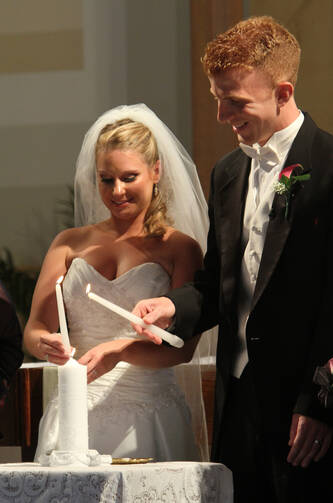A move to separate the sacrament of matrimony from civil marriage in the United States may mark the latest salvo in the culture wars. The thrust has left some Christians accused of retreating from the public square, an accusation denied by R. R. Reno, editor of the publication First Things, where a "Marriage Pledge" has been posted online for individual ministers and lay people to sign. What’s behind this pledge is a belief that in the United States “civil authorities have adopted a definition of marriage that explicitly rejects the age-old requirement of male-female parenting.”
The pledge states that “in a few short years or even months, it is very likely that this new definition will become the law of the land, and in all jurisdictions the rights, privileges, and duties of marriage will be granted to men in partnership with men, and women with women.”
That the government wants to extend the civil contract to same-sex couples should not affect the church’s cooperation with the state to enable its ministers to offer the convenience of a marriage that is recognized by both church and state. Only if the state were to demand that priests as state functionaries marry same-sex couples would there be an excuse for severing the tie.
The Marriage Pledge declares that “To continue with church practices that intertwine government marriage with Christian marriage will implicate the Church in the false definition of marriage.”
It adds that those who sign the Marriage Pledge “will no longer serve as agents of the state in marriage. We will no longer sign government-provided marriage certificates. We will ask couples to seek civil marriage separately from their church-related vows and blessings. We will preside only at those weddings that seek to establish a Christian marriage in accord with the principles articulated and lived out from the beginning of the Church’s life.”
It is worth noting that currently there is no intertwining. The state is simply recognizing as valid for civil purposes what Catholics do. In fact, if Catholics marry only civilly without a dispensation to do so, the church does not recognize their union as a marriage. So much for intertwining! In other countries, including Catholic ones such as Spain, Italy and Mexico, nations already have two ceremonies. It does not seem to make their marriages any better or more religious than those in the United States.
The issue of same-sex marriage aside, it is not as if the state stands for the same things the church stands for when it comes to marriage. State-sanctioned divorces and the ease with which they are granted stands pretty far from the church’s commitment to the indissolubility of marriage.
The Marriage Pledge seems like a Chicken Little exercise, an effort to rouse people in the culture wars, especially around anything related to gay rights.
Those considering the Marriage Pledge need to look at marriage today and the fact that fewer people choose any marriage at all. That is a huge problem. In 2011, Mark Gray, of the Georgetown University-based Center for Applied Research in the Apostolate, offered an analysis that the number of marriages being celebrated in the church dropped nearly 60 percent since 1972. It went from 415,487 in 1972 to 168,400 in 2010. This marked a shift from 8.6 marriages per 1,000 U.S. Catholics in 1972 to 2.6 marriages per 1,000 Catholics in 2010. Throw up one more hassle, like the need to go through two ceremonies—a church one and a civil one—and one hears the start of a refrain “Why bother getting married at all?”
There also is the fact that many people are tired of culture wars where the sacraments become battle tools—like refusal of Communion to politicians who do not vote in accord with church teaching on such issues as abortion and same-sex marriage. Or like those who refuse baptism to children of gay unions or irregular marriages. For the church to drop out of the civil marriage business feels like someone taking his marbles and going home because he doesn’t like the way the game is being played. It is unseemly at best and an over-reaction.
Mary Ann Walsh, R.S.M., is a member of the Northeast Community of the Sisters of Mercy of the Americas and U.S. Correspondent for America.









Hah! Yes!